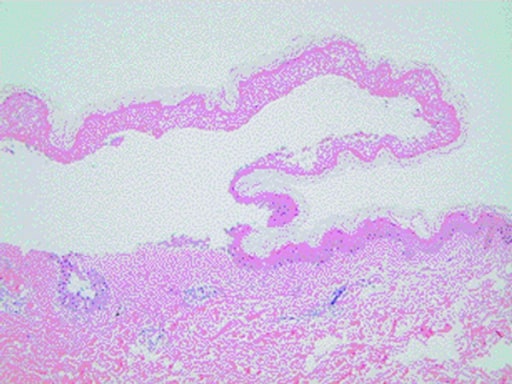Playlist
Show Playlist
Hide Playlist
Stevens-Johnson Syndrome
-
Slides Bullous Diseases.pdf
-
Reference List Dermatology.pdf
-
Download Lecture Overview
00:02 Stevens-Johnson syndrome. So let's talk about that for a moment. 00:06 Essentially, Stevens-Johnson syndrome is most often a drug-mediated disease process that lies on a spectrum with, at one end, erythema multiforme, which can be caused by either medications or sometimes infections, then Stevens-Johnson syndrome, medications or sometimes infections, then Stevens-Johnson syndrome, It is a T cell-mediated attack on keratinocytes. And again, if the attack is on the keratinocytes themselves, rather than the basement membrane, you're going to expect very thin-walled bullae, which are very likely to rupture. 00:39 You're not going to have those tense bullae. As I mentioned, most often, it's caused by medications, but 70% of the time, though, occasionally, its associated with mycoplasma or other types of infections in < 30% of cases. 00:54 SJS, unlike something like bullous pemphigoid, you're definitely going to have some constitutional symptoms: fevers, myalgias, malaise, etc. 01:04 nd this is a fairly rapidly progressive disease, as well. 01:07 This isn't something that's going to be indolent and take months to develop. 01:11 This could really occur within a matter of a few days to a week. 01:15 So, rapid progression of erythematous macules, then erythroderma, which means total body redness, and then your bullae are going to form, you're going to start seeing those mucosal lesions, etc. 01:26 In this case, because that skin, the wall of that blister, is so thin, Nikolsky sign will be positive. 01:33 Just rubbing your thumb along an area of skin that appears to be affected is going to lead that skin to peel right off. 01:41 90% of cases are going to have mucosal involvement, whether it's the oral mucosa, the lips, the conjunctiva, or the genitalia. 01:49 And as you can imagine, with a disease that involves such an extensive area of skin as well as mucosal areas with all these systemic symptoms, it does have a pretty high morbidity and mortality associated with it. 02:00 You're very susceptible to infections, electrolyte imbalances due fluid shifts and being unable to hold on to all the water in your body, hypovolemia, and potentially, septic shock.
About the Lecture
The lecture Stevens-Johnson Syndrome by Stephen Holt, MD, MS is from the course Allergic and Immune-mediated Skin Disorders.
Included Quiz Questions
Which of the following is a characteristic of Stevens-Johnson syndrome?
- Mucosal involvement
- T-cell–mediated destruction of the dermoepidermal junction
- Indolent onset
- Absence of systemic manifestations
- Negative Nikolsky's sign
Customer reviews
5,0 of 5 stars
| 5 Stars |
|
5 |
| 4 Stars |
|
0 |
| 3 Stars |
|
0 |
| 2 Stars |
|
0 |
| 1 Star |
|
0 |




